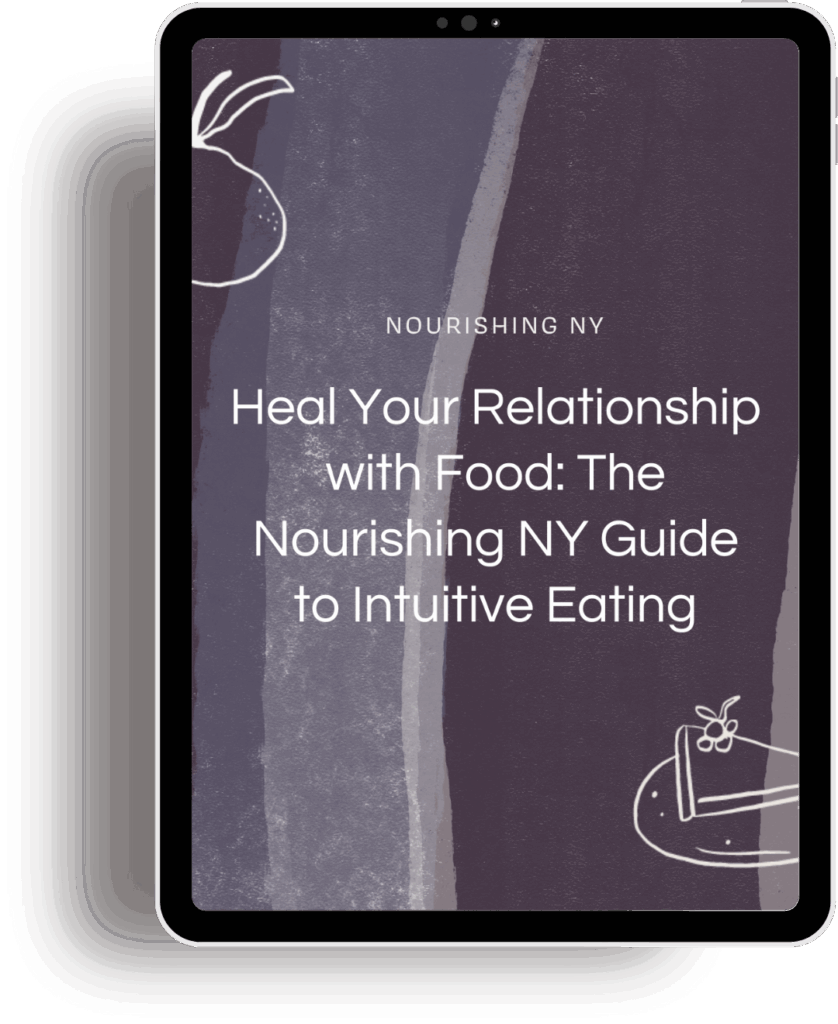Due to the complexity and both psychological and physical effects of eating disorders, seeking professional help is an integral part of recovery and treatment. Research has shown that earlier intervention significantly improves outcomes. Professionals, such as dietitians, therapists, physicians, can provide the necessary care and treatment modalities to support a sustainable recovery. Having a dynamic team of professionals can be incredibly supportive and equip individuals with the skills and knowledge to achieve recovery.
Eating disorder dietitians are critical members of a care team, offering individualized treatment plans, evidenced-based nutrition education, and therapeutic support to navigate and improve one’s overall relationship with their body and food. Dietitians with advanced training in eating disorders effectively integrate psychological and nutritional strategies to further support ongoing recovery.
What is an Eating Disorder Dietitian?
An eating disorder dietitian is a registered dietitian (RD) that has met stringent requirements in order to become accredited through the Commission on Dietetic Registration with additional training and certification in the treatment of eating disorders. To become an RD, one must earn a minimum of a graduate degree from a Didactic Program in Dietetics, which includes the necessary course prerequisites for dietetics practice, complete at least 1,000 hours of supervised practice under a dietitian as part of a dietetic internship, pass a national examination administered by the Commission on Dietetic Registration (CDR), obtain state licensure, (depending on one’s state’s regulations and requirements), and complete continuing education to maintain credentials.
The role of an eating disorder dietitian involves providing nutrition education, addressing metabolic needs via individualized meal plans, and integrating therapeutic modalities to address emotional and psychological factors. They offer ongoing monitoring and support to ensure that individuals meet nutrition goals safely and effectively. By collaborating with the treatment team, they ensure cohesion and communication for the individual’s treatment. Through compassion and expertise, eating disorder dietitians offer counseling, nutrition guidance, and clinical oversight to address the dynamic medical complexities that are associated with eating disorders.
Understanding the Role of an Eating Disorder Nutritionist
In contrast to the qualifications that a dietitian is required to meet, a nutritionist is not required to receive any formal training, though they may hold a degree in a nutrition-related field (i.e. Public Health), but this is not necessarily required. Nutritionists are not required to complete supervised hours, nor are they required to pass a formal examination. The title “Nutritionist” is protected in some places, but the regulation varies across states, allowing anyone to call themselves a “nutritionist.”
Similarly to an eating disorder dietitian, eating disorder nutritionists may offer individual nutrition plans, evaluate one’s nutritional status, provide support with behavior change, monitor progress, and provide nutrition education. While they may use similar counseling techniques to those of eating disorder dietitians, an eating disorder nutritionist may have a more limited scope of practice.
Although eating disorder nutritionists may provide a similar means of support and nutrition education, their education and accreditation may vary significantly from dietitians. Nutritionists typically provide more general nutrition education, while dietitians offer evidence-based medical nutrition therapy tailored to specific medical conditions. Regulations and practice settings may also vary, as well as the depth of clinical advice that nutritionists are able to provide. Given the less stringent qualifications, nutritionists may not be as well-equipped to handle medical complexities, such as eating disorders.
Why Choose an Eating Disorder Nutritionist in NYC?
Choosing an eating disorder dietitian in NYC may be highly advantageous, given the diverse community and access to resources. Dietitians in NYC are well-trained professionals with dynamic backgrounds and impressive experience levels. They are able to offer both in-person and Telehealth to individuals to expand accessibility and care. The progressive nature of NYC and the cultural competency cultivates an environment in which dietitians are highly knowledgeable in Health at Every Size, Anti-Diet culture, and Intuitive Eating. Additionally, there are numerous eating disorder treatment centers located in NYC with a vast network of professional connections.
Key Qualities to Look for in an Eating Disorder Dietitian or Nutritionist
When searching for an eating disorder dietitian, there are important qualities that can make a significant difference in the client-clinician relationship. It’s important to find a clinician with specialized training, advanced certifications, and a compassionate, understanding approach. Potential clients should also inquire about the eating disorder dietitian’s collaboration with other treatment team members and how they connect with the multidisciplinary team. Additionally, seeking a dietitian with experience in treating various types of eating disorders (e.g., anorexia, OSFED, bulimia, ARFID) ensures that they are able to offer individualized support specific tailored to your needs.
The Role of an Eating Disorder Dietitian or Nutritionist in Your Recovery Journey
An eating disorder dietitian plays a critical role in one’s recovery, offering not only a tremendous amount of support, but also providing nutrition expertise, meal planning, and individual nutrition therapy. The ED dietitian aims to meet the unique needs of the individual through a combination of nutrition psychoeducation, emotional support, clinical oversight, one-on-one counseling, and collaboration with other members of the team. By building connection and rapport, the dietitian gains a clearer understanding of the individual’s belief systems, behaviors, and relationship with both food and their body to provide sustainable tools for long-term recovery.
How to Find the Best Eating Disorder Dietitian or Nutritionist in NYC
The search for an eating disorder dietitian can feel daunting, but there are several ways to simplify the process. You may first opt to review the dietitians that are in-network with your insurance plan, if you choose to utilize their insurance benefits. You can also explore online directories, such as IAEDP (International Association of Eating Disorders Professionals) or National Eating Disorders Association (NEDA). Additionally, therapists, physicians, and other medical providers are great sources for offering referrals. More general searches, such as “eating disorder dietitians in NYC” may provide useful results.
Not only are the eating disorder dietitians at Nourishing NY highly trained and experienced, they are also in-network with insurance, making their expert nutrition care both affordable and accessible. Once you have identified a few dietitians that you are interested in connecting with, asking certain questions can help determine if they are the appropriate fit. Many dietitians offer a discovery call prior to scheduling, and you may choose to ask any of the following questions:
What is your experience with eating disorder treatment, and do you focus on any specific types of eating disorders?
-
Do you have any specialized training or certifications in eating disorder treatment?
-
Can you describe your approach and counseling style in sessions?
-
How often will we meet? How long are sessions?
-
Can you explain what a typical session looks like?
-
Are you in-network with any insurance providers? What is the process of verifying insurance benefits?
-
What are your office hours and general availability for sessions?
-
Do you typically collaborate with other members of the treatment team (e.g., therapist, psychiatrist, primary care physician)?
-
What are some ways that we will navigate challenges and barriers to recovery together?
Know that finding the right dietitian may take time, but it’s crucial that you feel aligned with and trust your clinician. Ultimately, a strong relationship is key to fostering lasting change and supporting your recovery.
Success Stories: Real Life Examples
Working with Alexa has been so positive for my relationship to food and overall wellness—mental, physical, emotional. After a period of restriction, then excess, then happy normalization, I found myself newly struggling with food due to new life circumstances. I reached out to Alexa and she scheduled a 15-minute intro call right away. I liked her approach and we started meeting every week, where I share how my relationship with food has been going, when/what I am eating, and how my week as in general. She is a wonderful listener, active and present, clearly focused on about what you have to say. She takes notes and then asks questions and we work out strategies to improve my nourishment and relationship with food. In addition to being very present and attentive in meetings, she is extremely prompt, responsive, and flexible in her communication. After every meeting, she sends a brief recap of the meeting and a few incremental goals to work on in the next week. Alexa clearly cares immensely about helping others find peace with food, and I HIGHLY recommend her to anyone looking to find food freedom! I am confident that I will find and sustain mine now that I am working with her.
-ML
I have seen many dietitians over the years I’ve struggled with an eating disorder, and none of them compare to Courtney. Passionate, kind, and understanding, Courtney finds the balance between meeting me where I’m at and pushing me in the ways I need. Inspired by Courtney’s own recovery, I know that I am in the best hands I could possibly be, and for the first time in many years, I feel hopeful.
-BB
Before starting with Nourishing NY, I struggled with disordered eating and poor body image for my entire teenage and adult life. It was so bad that it was affecting my ability to live a normal and happy life. I found myself saying no to social gatherings and parties because I wanted to avoid food all together and I felt insecure around other people. I was constantly planning my days around food and what I was going to eat that day to make sure my day was “perfect”. Meanwhile I felt isolated and alone with this preoccupation with food and would turn to binge eating. From my first intro phone call with Mia, I immediately felt understood and hopeful for the first time in my life. I didn’t feel like I was being judged or looked down upon for these behaviors I saw as failures; instead, I felt comfortable and safe talking about my struggles. Mia helped come up with a plan that worked best for me. Not only coming up with nutritious meals and snacks that I enjoyed but also providing me with strategies and coping mechanisms to deal with my fear around foods. I am so happy to say that I feel like I have just started a new chapter in my life that doesn’t revolve around food, but actually living my life. I am able to go to social events and hang out with friends without fearing what food is going to be there or what my body is going to look like. I am able to eat foods I always ruled out as “bad” and I’m able to listen to my body cues in a healthy way. I cannot recommend Nourishing NY enough!
-AL



